Eczema, a chronic inflammatory skin condition, affects millions worldwide with symptoms ranging from itching and redness to painful blisters and cracked skin. While conventional treatments such as corticosteroids and immunosuppressants offer temporary relief, many individuals are turning toward complementary and integrative methods that promise more sustainable results with fewer side effects. Eczema alternative healing has gained traction as both an adjunct and, for some, a primary mode of care. By exploring traditional wisdom, modern research, and holistic techniques, patients are increasingly finding hope beyond the confines of pharmaceutical interventions.
You may also like: Can Atherosclerosis Be Reversed with Exercise? What Science Says About Unblocking Arteries Naturally
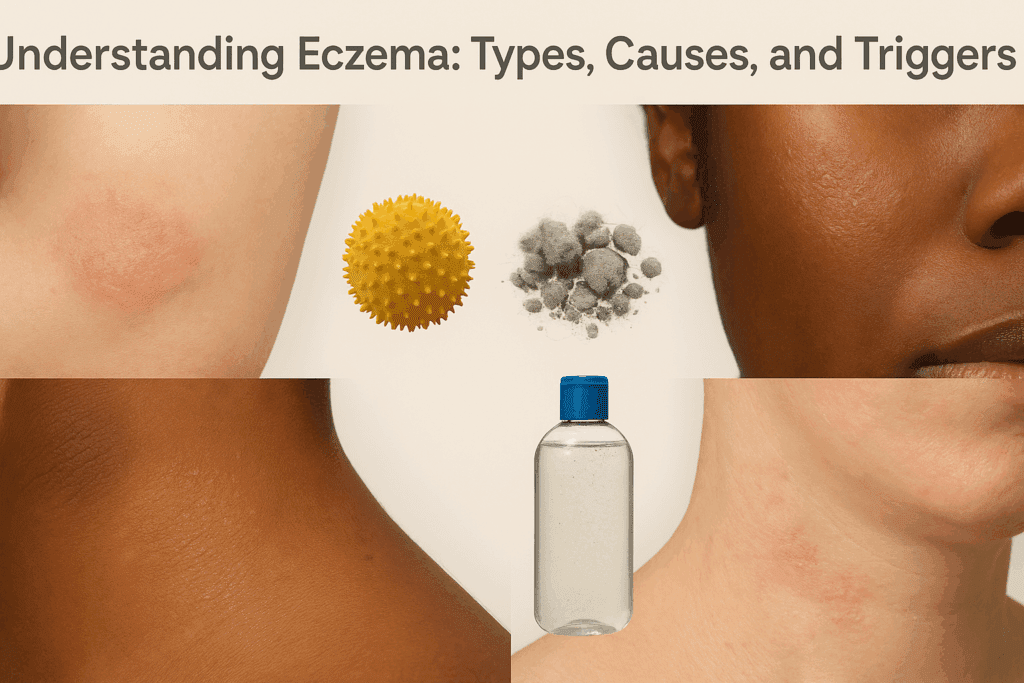
Understanding Eczema: Types, Causes, and Triggers
To fully appreciate the promise of eczema alternative healing, one must first understand the complexity of the condition itself. Eczema is not a singular disease but a group of conditions, the most common being atopic dermatitis. Other forms include contact dermatitis, dyshidrotic eczema, and nummular eczema. Although they differ in appearance and triggers, all share the common denominator of a compromised skin barrier and a dysregulated immune response.
The causes of eczema are multifactorial, involving a combination of genetic predispositions and environmental exposures. Individuals with a family history of eczema, asthma, or hay fever are more likely to develop the condition. Triggers can range from harsh detergents and allergens to emotional stress and climate changes. The question often arises: can eczema get infected or does eczema spread? The answer is yes; broken skin can become a breeding ground for bacteria like Staphylococcus aureus, leading to infected eczema, which requires immediate attention. Moreover, while eczema is not contagious, it can spread across the body in response to unmitigated inflammation.
The Limitations of Conventional Therapies
Standard eczema treatment protocols primarily revolve around topical corticosteroids, antihistamines, moisturizers, and in severe cases, systemic immunosuppressants. While these may reduce inflammation and itching temporarily, they often fall short of offering long-term relief. Prolonged steroid use is associated with skin thinning, hormonal imbalances, and resistance over time. Additionally, systemic treatments can compromise the immune system, leaving the body vulnerable to infections.
Another major drawback is the symptom-focused nature of these interventions. They rarely address the root cause—be it gut health imbalances, chronic stress, or environmental toxin exposure. As a result, flare-ups recur, and patients remain in a cycle of dependency. This is where the promise of eczema alternative healing becomes not only relevant but necessary.

Integrating Holistic Treatment for Eczema: A Paradigm Shift
Holistic treatment for eczema begins with the belief that skin health is a reflection of internal balance. The holistic model views the body as an interconnected system, where disruptions in one domain—like digestion or emotional health—can manifest externally. Treating eczema naturally requires a comprehensive assessment of diet, lifestyle, emotional well-being, and environmental exposures.
Holistic practitioners often begin with dietary changes, identifying and eliminating common allergens like gluten, dairy, soy, and processed sugars. These are believed to contribute to systemic inflammation. Additionally, natural eczema treatment protocols emphasize the importance of nourishing the gut microbiome, which plays a crucial role in immune function and skin barrier integrity. Supplements like probiotics, omega-3 fatty acids, and vitamin D are commonly recommended.
Mind-body practices also play an integral role. Chronic stress is a well-known trigger for eczema, and methods like meditation, yoga, and biofeedback have shown promise in reducing flare-up frequency and severity. Integrating these approaches represents a significant paradigm shift in how we approach chronic skin conditions.
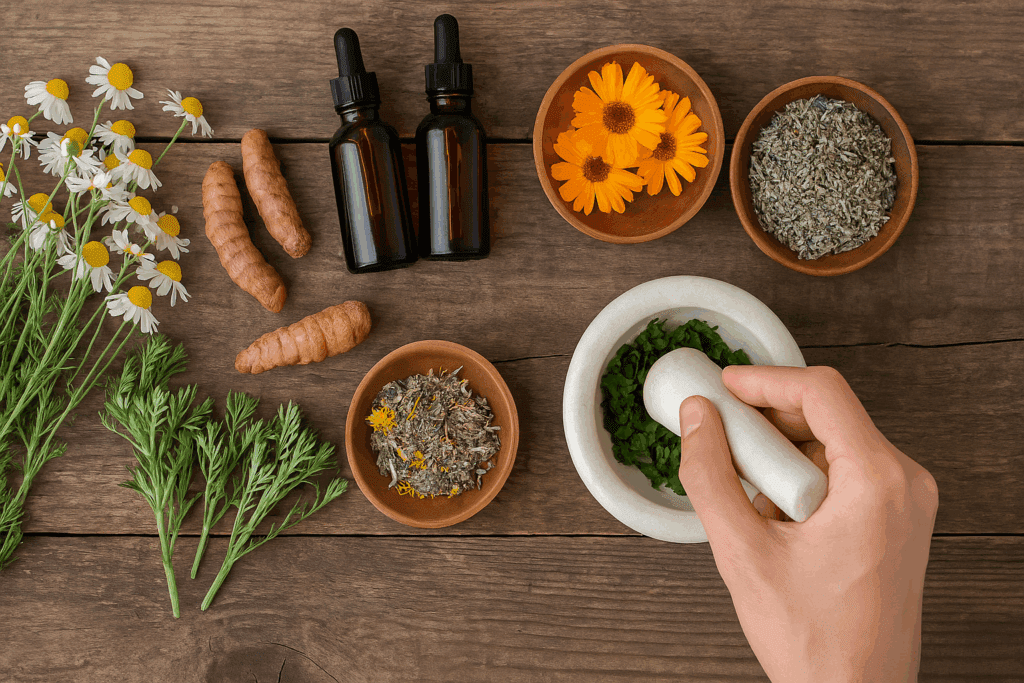
Exploring Eczema Alternative Healing Through Herbal Medicine
One of the cornerstones of eczema alternative healing is the use of botanical therapies. Traditional systems such as Ayurveda, Traditional Chinese Medicine (TCM), and Western herbalism offer centuries-old remedies that continue to be validated by modern science. Herbs like chamomile, calendula, licorice root, and turmeric are celebrated for their anti-inflammatory, antimicrobial, and skin-soothing properties.
Chamomile, for instance, contains compounds that reduce inflammation and itching when applied topically. Calendula has been used for generations as a wound healer and skin regenerator. Turmeric, rich in curcumin, not only reduces oxidative stress but also modulates immune response. These botanicals can be incorporated into homemade remedies for eczema in the form of salves, compresses, or infused oils.
Internal herbal therapies also hold promise. Adaptogenic herbs like ashwagandha and holy basil help the body respond to stress, a key trigger in many eczema cases. Burdock root and dandelion are used to support liver detoxification, promoting systemic healing. However, it’s crucial that these remedies are used under the guidance of qualified professionals to avoid potential contraindications and interactions.
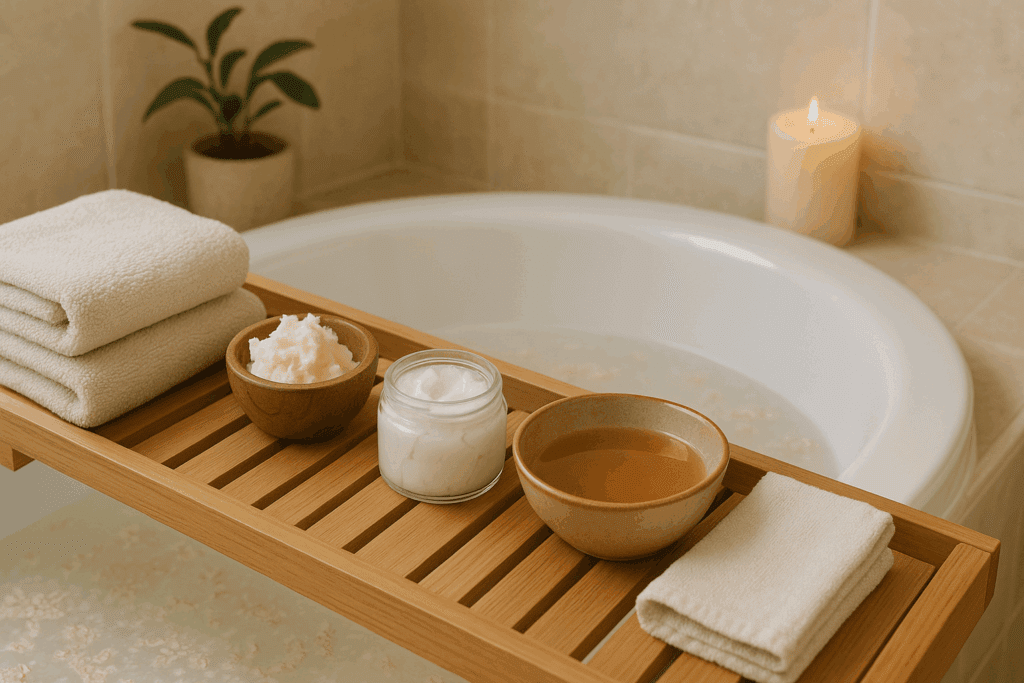
Eczema Natural Home Remedy Practices for Daily Relief
Daily routines can have a profound impact on the progression and management of eczema. Eczema natural home remedy practices offer immediate comfort and long-term benefits when consistently applied. One foundational approach is the use of emollient-rich natural moisturizers. Ingredients such as shea butter, coconut oil, and jojoba oil are not only deeply hydrating but also help restore the skin’s lipid barrier.
Oatmeal baths are another widely endorsed remedy. Colloidal oatmeal has anti-inflammatory and anti-itch properties that soothe irritated skin. Apple cider vinegar, when diluted, can balance the skin’s pH and act as an antimicrobial agent. Cool compresses, used during flare-ups, can offer relief from relentless itching and reduce inflammation.
In addition to these practices, ensuring a clean living environment is vital. Dust mites, pet dander, and mold are common environmental triggers that exacerbate eczema. Investing in a quality air purifier and hypoallergenic bedding can significantly reduce allergen load. These practical strategies underscore how natural remedies for eczema can be seamlessly integrated into everyday life.
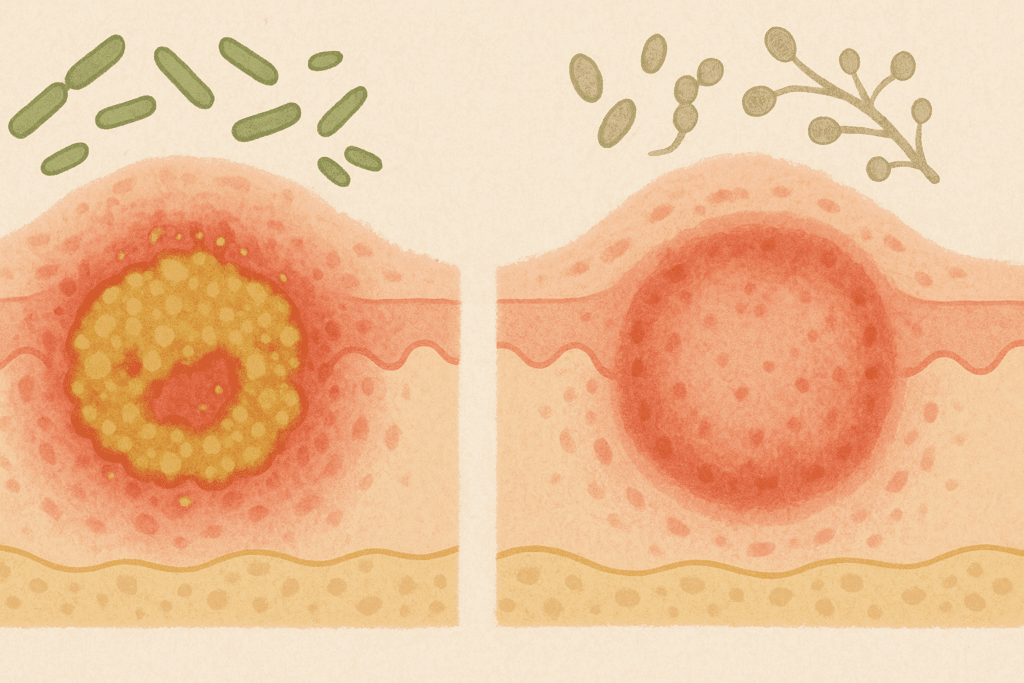
Is Eczema Fungal or Bacterial? Understanding Infected Eczema
A critical aspect of managing eczema is recognizing when complications arise. A common question is whether eczema is fungal or bacterial. The answer is that eczema itself is not caused by either, but the compromised skin barrier makes it vulnerable to both bacterial and fungal infections. Infected eczema can present with yellow crusting, increased redness, and pus-filled blisters.
The most frequent culprit is Staphylococcus aureus, a bacteria that thrives on broken skin. In some cases, fungal elements like Candida can also take hold, especially in warm, moist areas. Understanding these secondary infections is key to preventing more serious complications. Can eczema become infected? Absolutely, and recognizing the signs early allows for effective intervention.
How to treat infected eczema at home depends on the severity. Mild infections can sometimes be managed with natural antiseptics like tea tree oil or diluted apple cider vinegar. However, serious infections warrant immediate medical attention. Over-reliance on natural methods without proper diagnosis can lead to worsening symptoms. Therefore, a balanced approach that respects both natural and biomedical insights is essential.
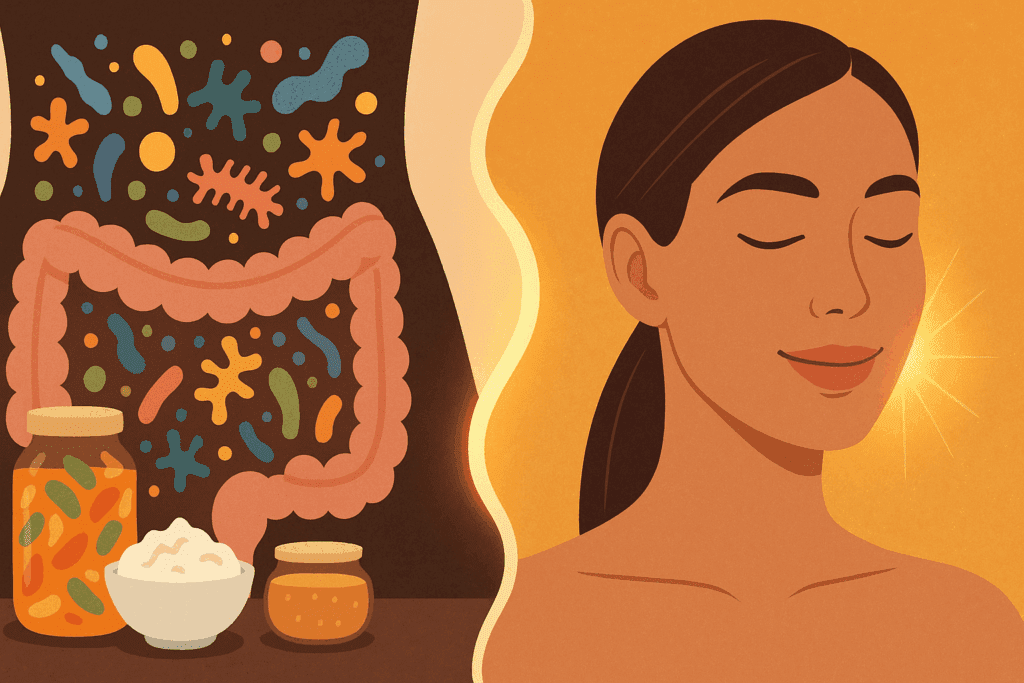
How to Heal Eczema Naturally by Addressing Root Causes
True healing begins when one looks beyond symptoms and seeks to understand the underlying causes. How to heal eczema naturally requires a commitment to self-inquiry and lifestyle transformation. At the core is the gut-skin axis—a bidirectional communication pathway where the health of the gastrointestinal tract directly influences skin integrity.
Many individuals with eczema also suffer from gastrointestinal issues like bloating, constipation, or irritable bowel syndrome. This correlation has led researchers to investigate the role of dysbiosis, or microbial imbalance, in skin inflammation. Probiotics and fermented foods, such as sauerkraut and kefir, are increasingly recognized as allies in restoring microbial harmony.
Sleep and circadian rhythm also play a pivotal role. Inadequate sleep can lead to increased cortisol levels, further inflaming the skin. Creating a sleep sanctuary, free from blue light and stressors, is a foundational step in natural eczema treatment. Nutrition, stress management, and environmental detoxification all contribute to a comprehensive healing journey.

Breakthroughs in Eczema Alternative Healing Therapies
Recent years have witnessed exciting breakthroughs in eczema alternative healing that are backed by emerging scientific evidence. Phototherapy using narrowband UVB light has been shown to reduce inflammation and itching without the systemic side effects of immunosuppressants. While technically a medical intervention, its natural light-based modality aligns with holistic principles.
Another innovation is the use of topical probiotics. These products aim to restore balance to the skin’s microbiome, reducing colonization by harmful bacteria. Clinical trials suggest they may reduce flare-ups and improve skin texture. Similarly, advances in genomic testing now allow practitioners to tailor treatments based on genetic predispositions, revolutionizing personalized care.
Mind-body therapies, once considered fringe, are now gaining institutional acceptance. Cognitive-behavioral therapy (CBT), hypnotherapy, and mindfulness-based stress reduction (MBSR) are proving effective not only in reducing stress-induced flares but also in improving overall quality of life. These breakthroughs validate the multifaceted approach at the heart of eczema alternative healing.
How to Stop Eczema Itching Immediately Using Home Remedies
Few symptoms are as disruptive and distressing as the incessant itching associated with eczema. How to stop eczema itching immediately home remedies include a variety of simple yet effective techniques. Cool compresses, when applied to the affected area, constrict blood vessels and reduce the inflammatory response.
Applying aloe vera gel directly from the plant soothes the skin and offers antimicrobial benefits. The mucilaginous nature of aloe helps to coat the skin, reducing friction and sensitivity. Witch hazel, another natural astringent, can reduce itching and inflammation when dabbed gently on the skin.
Avoiding hot showers and using fragrance-free cleansers are essential. Hot water strips the skin of natural oils, exacerbating dryness and itching. Lukewarm showers followed by immediate moisturization trap hydration and protect the skin barrier. Together, these strategies create an immediate, non-pharmacological path to relief.
Natural Ways to Treat Eczema with Lifestyle and Diet
Lifestyle modification is often the most sustainable form of healing. Natural ways to treat eczema must begin with dietary evaluation. The anti-inflammatory diet, rich in vegetables, fruits, lean proteins, and healthy fats, reduces the systemic inflammation that fuels eczema. Omega-3 fatty acids, found in flaxseed and fatty fish, are especially beneficial.
Avoidance of processed foods, artificial additives, and known allergens can significantly reduce flare-ups. Hydration is another overlooked factor; water supports detoxification and skin elasticity. Herbal teas like nettle or chamomile not only hydrate but also offer anti-inflammatory benefits.
Physical activity plays a dual role—boosting circulation and aiding detoxification while also reducing stress. However, sweat can irritate eczema-prone skin, so it’s important to shower promptly after exercise. These holistic practices underscore how natural ways to heal eczema are rooted in daily living, not just episodic treatments.
Homemade Remedies for Eczema: Time-Tested and Science-Backed
Homemade remedies for eczema often combine ancestral wisdom with modern validation. A classic example is the turmeric paste, made by mixing turmeric with a carrier oil like coconut or olive oil. Applied topically, it can reduce inflammation and fight microbial invasion. Another favorite is the honey mask. Raw honey is both antimicrobial and deeply hydrating, making it ideal for dry, cracked skin.
Beeswax-based salves infused with herbs like calendula and comfrey provide a protective barrier while encouraging healing. These remedies are often free from synthetic chemicals, making them suitable for sensitive skin. Nonetheless, patch testing is always recommended to avoid allergic reactions.
Steam therapy with essential oils like lavender or eucalyptus can relieve nasal congestion often linked to atopic eczema. Additionally, DIY bath soaks with Epsom salt, baking soda, and oatmeal offer whole-body relief, particularly during widespread flare-ups. These homemade solutions empower individuals to take control of their healing journey.
How to Cure Eczema Naturally and Permanently: Fact or Fiction?
The idea of a permanent cure for eczema remains controversial. While conventional medicine typically labels eczema as a lifelong condition, many holistic practitioners believe that remission is achievable through comprehensive lifestyle changes. How to cure eczema naturally and how to cure eczema permanently home remedies are common queries that reflect a deep desire for lasting relief.
Case studies and anecdotal reports suggest that individuals who eliminate dietary triggers, restore gut health, manage stress, and detoxify their environments can achieve long-term remission. However, it’s important to differentiate between remission and cure. A cure implies eradication of the underlying predisposition, which may not be possible in every case. Remission, however, is a realistic and empowering goal.
To pursue permanent healing, consistency is key. Sporadic changes are unlikely to produce lasting results. Regular monitoring, journaling symptoms, and seeking guidance from integrative healthcare providers can make a significant difference. While the road to recovery is seldom linear, the destination is well worth the journey.
Eczema Holistic Protocols: A Blueprint for Sustainable Healing
Holistic protocols for eczema are structured around personalization. No two cases are alike, and therefore, treatment must be customized. Initial assessment usually involves identifying potential food intolerances, evaluating stress levels, and reviewing past medical history. Functional lab tests, such as gut microbiome analysis and hormone panels, provide valuable insights.
A typical holistic protocol may begin with an elimination diet, followed by a gut-healing regimen using supplements like L-glutamine and digestive enzymes. Concurrently, stress management techniques and sleep hygiene practices are introduced. Environmental audits help eliminate toxins and allergens that may be perpetuating the condition.
These protocols often unfold in phases, beginning with detoxification, followed by repair and finally maintenance. The end goal is to equip individuals with the tools to maintain remission and prevent relapse. This systems-based approach embodies the very essence of treating eczema holistically.
Frequently Asked Questions: Advanced Insights into Eczema Alternative Healing
What distinguishes eczema alternative healing from standard dermatological treatments?
Eczema alternative healing diverges from conventional approaches by focusing on underlying systemic imbalances rather than topical symptom suppression. Unlike corticosteroids or immunosuppressants, which aim to reduce inflammation directly on the skin, alternative strategies prioritize gut health, immune system modulation, and environmental detoxification. These methods often incorporate holistic treatment for eczema that includes herbal medicine, functional nutrition, stress reduction, and energy balancing practices like acupuncture or reiki. This integrative perspective allows for a broader understanding of what causes flare-ups and how to prevent them. The most compelling aspect of eczema alternative healing is its commitment to long-term skin resilience and self-regulation rather than short-term relief.
How can stress and emotional trauma impact eczema, and are there natural ways to heal eczema from this angle?
Emotional stress and unresolved trauma are potent triggers for eczema, often overlooked in clinical settings. Stress activates the hypothalamic-pituitary-adrenal (HPA) axis, increasing cortisol levels that can suppress immune function and weaken the skin barrier. Chronic emotional tension may also contribute to neurogenic inflammation, a lesser-known pathway linking psychological distress to skin flare-ups. Techniques such as somatic therapy, trauma-informed yoga, and emotional freedom technique (EFT) have shown promise in calming this pathway. These mind-body interventions are increasingly recognized as natural ways to treat eczema by restoring emotional balance and breaking the inflammatory cycle at its root.
Can eczema become infected even when mild, and how do you differentiate infected eczema from an ordinary flare-up?
Yes, even mild eczema can become infected if the skin barrier is compromised and exposed to opportunistic pathogens. Infected eczema is often distinguished by sudden increases in redness, warmth, pain, and the presence of oozing or crusting lesions. A foul odor or swelling around lesions may indicate bacterial colonization, typically by Staphylococcus aureus. It is crucial to recognize that infected dermatitis might not always look dramatic; subtle shifts can signal underlying issues. In terms of how to treat infected eczema at home, using diluted natural antiseptics like manuka honey or propolis alongside antimicrobial essential oils such as tea tree or thyme—under expert guidance—may be effective in the early stages before medical escalation is needed.
What role do fermented foods play in treating eczema naturally, and how do they compare to probiotic supplements?
Fermented foods offer a dynamic and bioavailable form of probiotic support, which is essential in any natural eczema treatment. Unlike many commercial probiotic capsules, fermented foods like kimchi, sauerkraut, kefir, and natto contain a diverse array of live cultures along with prebiotics, enzymes, and bioactive peptides. These elements help strengthen the gut-skin axis by modulating the immune system and reducing systemic inflammation. For individuals exploring how to cure eczema naturally, including a rotation of fermented foods can be more impactful than relying solely on supplementation. That said, some individuals with histamine intolerance may initially react to ferments, so a personalized approach is vital when choosing between food-based probiotics and encapsulated forms.
Can eczema spread to other parts of the body, and what mechanisms are responsible for this pattern?
While eczema itself is not contagious, it can indeed spread across the body due to immune hypersensitivity, barrier dysfunction, and self-reinoculation through scratching. When someone asks, “can eczema spread” or “does eczema spread,” it’s important to clarify that the inflammatory response may migrate or expand to new areas over time, especially in the absence of a consistent skin-care regimen. Psychological stress, allergen exposure, and hormonal shifts may also play roles in expanding the condition’s footprint. Preventing further spread involves not only topical care but also systemic strategies like detoxification, dietary modification, and consistent use of home remedies for eczema that strengthen the skin’s natural defense.
What are the most effective homemade remedies for eczema flare-ups in dry winter months?
In dry, cold climates, eczema often becomes more severe due to reduced skin hydration and environmental stress. Homemade remedies for eczema during winter should focus on deep moisturization, occlusion, and internal nourishment. A potent blend of shea butter, beeswax, and calendula oil provides both hydration and a protective layer against wind and low humidity. For internal support, warm bone broths and fatty fish offer collagen and omega-3s that reinforce the skin barrier. Herbal infusions like marshmallow root or slippery elm can be sipped to soothe internal inflammation. These seasonal adjustments are central to an effective eczema treatment at home, especially when paired with humidifiers and protective clothing.
How do practitioners approach personalized eczema holistic protocols, and what tools do they use for assessment?
Eczema holistic protocols often begin with a comprehensive intake that evaluates dietary history, environmental exposures, emotional health, and gut function. Practitioners may utilize tools like food sensitivity testing, stool microbiome analysis, and cortisol profiling to uncover hidden imbalances. Rather than prescribing a one-size-fits-all remedy, these assessments guide targeted interventions such as elimination diets, liver support herbs, or adaptogenic stress modulators. The integration of functional lab data allows for a refined understanding of how to treat eczema holistically, making it possible to tailor treatment plans that evolve as the body heals. This data-informed approach supports the long-term success of natural remedies for eczema.
Are there emerging innovations in alternative medicine for eczema that show scientific promise?
Yes, several cutting-edge developments in alternative medicine for eczema are beginning to bridge the gap between traditional wisdom and modern science. One such innovation is the use of microbiome-restoring skin sprays derived from Nitrosomonas eutropha, a beneficial bacteria that may rebalance the skin’s microbial ecosystem. Another promising avenue involves low-dose herbal immunotherapy, where carefully calibrated botanical extracts are used to recalibrate hypersensitive immune responses. Functional neurology techniques, including vagus nerve stimulation, are also being explored for their capacity to reduce inflammation and promote skin healing. These developments signal a future where treating eczema naturally may involve a hybrid of ancestral methods and biotechnology.
How to stop eczema itching immediately home remedies: what actually works in real-time situations?
When faced with sudden, intense itching, rapid-response home remedies are essential. One effective method is using a chilled herbal poultice made from chamomile or green tea, which cools the skin while providing anti-inflammatory polyphenols. A topical paste of bentonite clay and aloe vera can also draw out irritants while soothing the skin. For nighttime itching, wrapping affected areas in medical-grade wet wraps soaked in calendula or oat-infused water can reduce histamine-driven inflammation. These methods, when part of a broader eczema natural home remedy plan, provide both comfort and function. Addressing itching quickly helps break the scratch-itch cycle and reduce the likelihood of eczema becoming infected.
What psychological or social benefits have been reported by individuals who pursue eczema treatment natural remedies?
Individuals who adopt eczema treatment natural remedies often report a renewed sense of agency and psychological empowerment. Engaging with their healing process—through cooking anti-inflammatory meals, preparing herbal balms, or practicing mindfulness—can restore a feeling of control over their health. Socially, many people find community in support groups or wellness circles that focus on treating eczema holistically, offering a level of shared understanding absent in conventional clinical settings. This sense of connection and self-advocacy reduces the emotional burden often associated with chronic skin conditions. In this way, natural ways to cure eczema offer more than physical benefits—they foster resilience, self-compassion, and deeper lifestyle transformation.
Reflecting on the Importance of Treating Eczema Naturally and Holistically
As eczema continues to affect lives across the globe, the limitations of conventional medicine underscore the need for integrative solutions. Eczema alternative healing offers a multi-dimensional approach that addresses root causes rather than just symptoms. By combining the wisdom of natural remedies for eczema with modern innovations and personalized care, this path opens the door to sustainable relief and enhanced quality of life.
The diversity of available therapies—from herbal medicine and home remedies to lifestyle interventions and mind-body practices—empowers individuals to participate actively in their healing. Rather than being passive recipients of symptomatic treatment, they become co-creators of their wellness journey. With proper guidance, discipline, and an open mind, healing eczema naturally is not only possible but increasingly probable.
This new paradigm does not reject science; it expands it. It invites collaboration between conventional and alternative modalities, each contributing its strengths. In doing so, eczema treatment at home becomes more than just a management strategy—it becomes a pathway to lasting transformation. In a world where chronic conditions are on the rise, embracing the possibilities of eczema holistic care could well be the breakthrough many have been waiting for.


